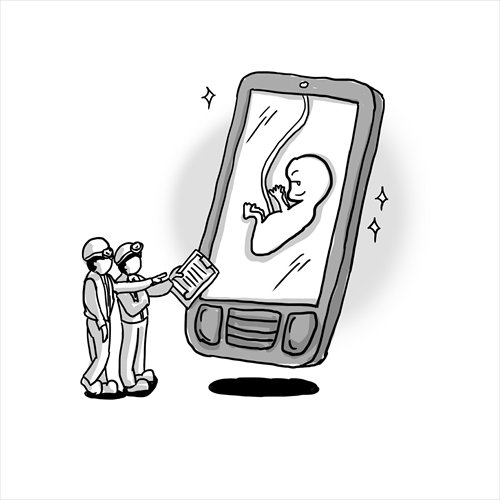HOME >> BUSINESS
Xi’s gift shows China’s progress in innovation
Source:Global Times Published: 2014-9-24 17:48:01
Chinese phone makers grab global share

Illustration: Lu Ting/GT
It is unusual to give a smartphone to another country's leader during an official visit, but that's exactly what President Xi Jinping did during the latest meeting of the Shanghai Cooperation Organization (SCO) in Dushanbe, Tajikistan.
Xi's choice, the ZTE Grand SII, indicates that the government was making efforts to promote Chinese-designed smartphones to the rest of the world and show that Chinese companies have world-class research and manufacturing capabilities.
Compared with traditional national gifts such as Chinese calligraphy paintings, silk, or fine art, the smartphone captures the current zeitgeist. It showcases China's rising power and illustrates that the country is advancing from "the world's factory" to a manufacturer of innovative products.
In fact, Chinese mobile phone makers have been consistently gaining the favor of overseas consumers. Their market share of the mobile phone business grew from nothing in 2010 to 25 percent in the first quarter of this year. It's no wonder that mobile phones have become the fastest growing industry in China.
Take ZTE for example. As one of the leading Chinese smartphone makers, it started to explore the overseas market as early as 2005, and has since made headway in Europe, North America and Japan. ?
The Shenzhen-based company became the world's fourth largest smartphone maker in 2012, behind Samsung, Apple and BlackBerry, according to a report by IDC, a research firm that follows the global mobile phone industry. As much as 35 percent of ZTE's shipments go to markets outside China, including North America, Switzerland and the UK.
It is inevitable that Chinese mobile phone makers will grab more of the global market. The four largest smartphone makers in China, ZTE, Huawei, Coolpad and Lenovo, currently rank among the top 10 smartphone manufacturers worldwide. Thriving companies such as OPPO have also emerged. Their focus on technological innovation and intellectual property rights is what spurs their growth.
In 2014, ZTE not only put most of its resources into innovation, but also lured designers and researchers from BMW, Motorola and BlackBerry to join its team, in an attempt to improve user experience and make their products more competitive.?
According to the World Intellectual Property Organization, ZTE filed the most applications under the Patent Cooperation Treaty (PCT) in the world in 2012. It was the runner-up in 2013.
As early as 2007, Huawei, a Chinese communication company, was earning $15 billion in annual income, more than 60 percent of which came from overseas. Research and development investment accounted for more than 10 percent of its income, and the company owned more than 30 percent of its research and development facilities, according to a report conducted by the Enterprise Institute of Development Research Center in China. By the end of 2013, the company had been granted 36,500 patents in Europe alone, making it one of the world's top patent owners.
China's mobile phone industry got off to a late start compared with the US and Europe. In the 2G era, foreign companies completely controlled mobile phone technology. During the 3G period, Chinese smartphone makers made some inroads. Now, as 4G hits the market, some Chinese brands have obtained core intellectual skills.
As for ZTE, it must be an honor to have one of its products presented to another country's leader. However, the company still has to work out several thorny technological challenges to stay competitive, such as mobile Internet encryption to protect user privacy.
Besides promotion, Chinese smartphone makers need to put more effort into innovation, particularly in core technologies, for their popularity to continue to grow around the world.
Compiled by Global Times based on an article from the China Business News. bizopinion@globaltimes.com.cn
Newspaper headline: Chinese phone makers grab global share
Posted in: Comments